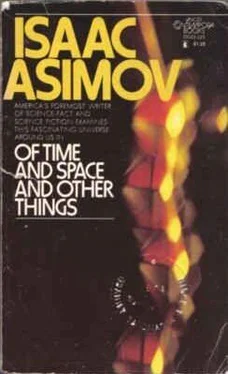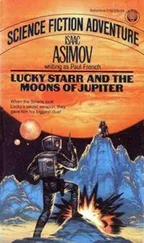Isaac Asimov - Of Time and Space and Other Things
Здесь есть возможность читать онлайн «Isaac Asimov - Of Time and Space and Other Things» весь текст электронной книги совершенно бесплатно (целиком полную версию без сокращений). В некоторых случаях можно слушать аудио, скачать через торрент в формате fb2 и присутствует краткое содержание. Год выпуска: 1972, ISBN: 1972, Издательство: Lancer Books, Жанр: Прочая научная литература, на английском языке. Описание произведения, (предисловие) а так же отзывы посетителей доступны на портале библиотеки ЛибКат.
- Название:Of Time and Space and Other Things
- Автор:
- Издательство:Lancer Books
- Жанр:
- Год:1972
- ISBN:ISBN: 0-447-33023-3
- Рейтинг книги:4 / 5. Голосов: 1
-
Избранное:Добавить в избранное
- Отзывы:
-
Ваша оценка:
- 80
- 1
- 2
- 3
- 4
- 5
Of Time and Space and Other Things: краткое содержание, описание и аннотация
Предлагаем к чтению аннотацию, описание, краткое содержание или предисловие (зависит от того, что написал сам автор книги «Of Time and Space and Other Things»). Если вы не нашли необходимую информацию о книге — напишите в комментариях, мы постараемся отыскать её.
Of Time and Space and Other Things — читать онлайн бесплатно полную книгу (весь текст) целиком
Ниже представлен текст книги, разбитый по страницам. Система сохранения места последней прочитанной страницы, позволяет с удобством читать онлайн бесплатно книгу «Of Time and Space and Other Things», без необходимости каждый раз заново искать на чём Вы остановились. Поставьте закладку, и сможете в любой момент перейти на страницу, на которой закончили чтение.
Интервал:
Закладка:
So as I wavered between the desire to fight for the right, and the suspicion that the right would be massacred and sunk without a trace, I decided to turn to astrology for help. Surely, a bit of astrologic analysis would tell me what was in store for me in any such confrontation.
Since I was born on January 2, that placed me under the, sign of Capricornus-the goat.
That did it! Politel but very firmly, I refused to be on the program!
5. Roll Call
When all the world was young (and I was a teen-ager), one way to give a science fiction story a good title was to make use of the name of some heavenly body. Among my own first few science fiction stories, for instance, were such items as "Marooned off Vesta," "Christmas on Ganymede," and "The Callistan Menace." (Real swino,,inc, titles, man!)
This has gone out of fashion, alas, but the fact remains that in the 1930's, a whole generation of science fiction fans grew up with the names of the bodies of the Solar System as familiar to them as the names of the American states. Ten to one they didn't know why the names were what they were, or how they came to be applied to the bodies of the Solar System or even, in some cases, bow they were pronounced-but who cared? When a tentacled monster came from Umbriel or lo, how much more im pressive that was than if it had merely come from Pbila delphia.
But ignorance must be battled. Let us, therefore, take up the matter of the names, call the roll of the Solar System in the order (more or less) in which the names were applied, and see what sense can be made of them.
The Earth itself should come first, I suppose. Earth is an old Teutonic word, but it is one of the glories of the English language that we always turn to the classic tongues as well. The Greek word for Earth was Gaia or, in Latin spelling, Gaea. This gives us "geography" ("earth-writing"), "geology" ("earth-discourse"), "geom etry" ("earth-measure"), and so on.
The Latin word is Terra. In science fiction stories a human being from Earth may be an "Earthl;ng" or an "Earthman," but he is frequently a "Terrestrial," while a creature from another world is almost invariably an "extra Terrestrial."
The Romans also referred to the Earth as Tellus Mater ("Mother Earth" is what it means). The genitive form of tellus is telluris, so Earthmen are occasionally referred to in s.f. stories as "TeHurians." There is also a chemical element "tellurium," named in honor of this version of the name of our planet.
But putting Earth to one side, the first two heavenly bodies to have been noticed were, undoubtedly and obvi ously, the Sun and the Moon, which, like Earth, are old Teutonic words.
To the Greeks the Sun was Helios, and to the Romans it was Sol. For ourselves, Helios is almost gone, although we have "helium" as the name of an element originally found in the Sun, "heliotrope" ("sun-turn") for the sun flower, and so on.
Sol persists better. The common adjective derived from sun" may be "sunny," but the scholarly one is "solar."
We may speak of a sunny day and a sunny disposition, but never of the "Sunny System." It is always the "Solar System." In science fiction, the Sun is often spoken of as Sol, and the Earth may even be referred to as "Sol Ill."
The Greek word for the Moon is Selene, and the Latin word is Luna. The first lingers on in the name of the chemical element "selenium," which was named for the Moon. And the study of the Moon's surface features may be called "selenography." The Latin name appears -m the common adjective, however, so that one speaks of a "lunar crescent" or a "lunar eclipse." Also, because of the theory that exposure to the li ht of the full Moon drove men crazy ("moon-struck"), we obtained the word "lunatic."
I have a theory that the notion of naming the heavenly bodies after mythological characters did not originate with the Greeks, but that it was a deliberate piece of copy cattishness. . To be sure, one speaks of Helios as the god of the Sun and Gaea as the goddess of the Earth, but it seems obvi ous to me that the words came first, to express the physical objects, and that these were personified into gods and goddesses later on.
The later Greeks did, in fact, feel this lack of mytho logical character and tried to make Apollo the god of the Sun and Artemis (Diana to the Romans) the goddess of the Moon. This may have taken hold of the Greek scholars but not of the ordinary folk, for whom Sun and Moon remained Helios and Selene. (Nevertheless, the in fluence of this Greek attempt on later scholars was such that no other impo rtant heavenly body was named for Apollo and Artemis.)
I would like to clinch this theory of mine, now, by taking up another heavenly body.
After the Sun and Moon, the next bodies to be recog nized as important individual entities must surely have been the five bright "stars" whose positions with respect to the real stars were not fixed and which therefore, along with the Sun and the Moon, were called planets (see Chapter 4).
The brightest of these "stars" is the one we call Venus, and it must have been the first one noticed-but not necessarily as an individual. Venus sometimes appears in the evening after sunset, and sometimes in the morning before sunrise, depending on which part of its orbit it happens to occupy. It is therefore the "Evening Star" some times and the "Morning Star" at other times. To the early Greeks, these seemed two separate objects and each was given a name.
The Evening Star, which always appeared in the west near the setting Sun, was named Hesperos ("evening" or 44 west"). The equivalent Latin name was Vesper. The Morning Star was named Phosphoros ("light-bringee'), for when the Morning Star appeared the Sun and its light were not far behind. (The chemical element "phosphorus" - Latin spelling-was so named because it glowed in the dark as the result of slow combination with oxygen.) The Latin name for the Morning Star was Lucifer. which also means "light-bringer."
Now notice that the Greeks made no use of mythology here. Their words for the Evening Star and Morning Star were logical, descriptive words. But then (during the sixth century B.c.) the Greek scholar, Pythagoras of Samos, arrived back in the Greek world after his travels in Babylonia. He brought with him a skullfull of Babylonian notions.
At the time, Babylonian astronomy was well developed and far in advance of the Greek bare beginnings. The Babylonian interest in astronomy was chiefly astrological in nature and so it seemed natural for them to equate the powerful planets with the powerful gods. (Since both had power over human beings, why not?) The Babylonians knew that the Evening Star and the Morning Star were a single planet-after all, they never appeared on the same day; if one was present, the other was absent, and it was clear from their movements that the Morning Star passed the Sun and became the Evening Star and vice versa. Since the planet representing both was so bright and beautiful, the Babylonians very logically felt it ap propriate to equate it with Ishtar, their goddess of beauty and love.
Pythagoras brought back to Greece this Babylonian knowledge of the oneness of the Evening and Morning Star, and Hesperos and Phosphoros vanished from the heavens.
Instead, the Babylonian system was copied and the planet was named for the Greek goddess of beauty and love, Aphrodite. To the Romans this was their corresponding goddess Yenus, and so it is to us.
Thus, the habit of naming heavenly bodies for gods and goddesses was, it seems to me, deliberately copied from the Babylonians (and their predecessors) by the Greeks.
The name "Venus," by the way, represents a problem.
Adjectives from these classical words have to be taken from the genitive case and the genitive form of "Venus" is Veneris. (Hence, "venerable" for anything worth the respect paid by the Romans to the goddess; and because the Romans respected old age, "venerable" came to be applied to old men rather than young women.)
Читать дальшеИнтервал:
Закладка:
Похожие книги на «Of Time and Space and Other Things»
Представляем Вашему вниманию похожие книги на «Of Time and Space and Other Things» списком для выбора. Мы отобрали схожую по названию и смыслу литературу в надежде предоставить читателям больше вариантов отыскать новые, интересные, ещё непрочитанные произведения.
Обсуждение, отзывы о книге «Of Time and Space and Other Things» и просто собственные мнения читателей. Оставьте ваши комментарии, напишите, что Вы думаете о произведении, его смысле или главных героях. Укажите что конкретно понравилось, а что нет, и почему Вы так считаете.












